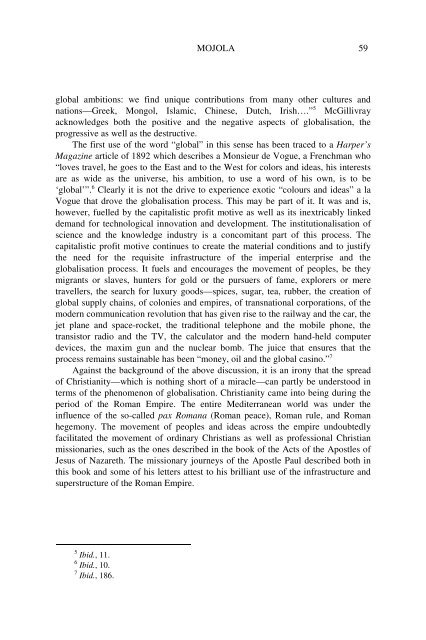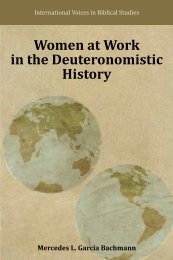Global Hermeneutics? - International Voices in Biblical Studies ...
Global Hermeneutics? - International Voices in Biblical Studies ...
Global Hermeneutics? - International Voices in Biblical Studies ...
Create successful ePaper yourself
Turn your PDF publications into a flip-book with our unique Google optimized e-Paper software.
MOJOLA 59<br />
global ambitions: we f<strong>in</strong>d unique contributions from many other cultures and<br />
nations—Greek, Mongol, Islamic, Ch<strong>in</strong>ese, Dutch, Irish….” 5 McGillivray<br />
acknowledges both the positive and the negative aspects of globalisation, the<br />
progressive as well as the destructive.<br />
The first use of the word “global” <strong>in</strong> this sense has been traced to a Harper’s<br />
Magaz<strong>in</strong>e article of 1892 which describes a Monsieur de Vogue, a Frenchman who<br />
“loves travel, he goes to the East and to the West for colors and ideas, his <strong>in</strong>terests<br />
are as wide as the universe, his ambition, to use a word of his own, is to be<br />
‘global’”. 6 Clearly it is not the drive to experience exotic “colours and ideas” a la<br />
Vogue that drove the globalisation process. This may be part of it. It was and is,<br />
however, fuelled by the capitalistic profit motive as well as its <strong>in</strong>extricably l<strong>in</strong>ked<br />
demand for technological <strong>in</strong>novation and development. The <strong>in</strong>stitutionalisation of<br />
science and the knowledge <strong>in</strong>dustry is a concomitant part of this process. The<br />
capitalistic profit motive cont<strong>in</strong>ues to create the material conditions and to justify<br />
the need for the requisite <strong>in</strong>frastructure of the imperial enterprise and the<br />
globalisation process. It fuels and encourages the movement of peoples, be they<br />
migrants or slaves, hunters for gold or the pursuers of fame, explorers or mere<br />
travellers, the search for luxury goods—spices, sugar, tea, rubber, the creation of<br />
global supply cha<strong>in</strong>s, of colonies and empires, of transnational corporations, of the<br />
modern communication revolution that has given rise to the railway and the car, the<br />
jet plane and space-rocket, the traditional telephone and the mobile phone, the<br />
transistor radio and the TV, the calculator and the modern hand-held computer<br />
devices, the maxim gun and the nuclear bomb. The juice that ensures that the<br />
process rema<strong>in</strong>s susta<strong>in</strong>able has been “money, oil and the global cas<strong>in</strong>o.” 7<br />
Aga<strong>in</strong>st the background of the above discussion, it is an irony that the spread<br />
of Christianity—which is noth<strong>in</strong>g short of a miracle—can partly be understood <strong>in</strong><br />
terms of the phenomenon of globalisation. Christianity came <strong>in</strong>to be<strong>in</strong>g dur<strong>in</strong>g the<br />
period of the Roman Empire. The entire Mediterranean world was under the<br />
<strong>in</strong>fluence of the so-called pax Romana (Roman peace), Roman rule, and Roman<br />
hegemony. The movement of peoples and ideas across the empire undoubtedly<br />
facilitated the movement of ord<strong>in</strong>ary Christians as well as professional Christian<br />
missionaries, such as the ones described <strong>in</strong> the book of the Acts of the Apostles of<br />
Jesus of Nazareth. The missionary journeys of the Apostle Paul described both <strong>in</strong><br />
this book and some of his letters attest to his brilliant use of the <strong>in</strong>frastructure and<br />
superstructure of the Roman Empire.<br />
5 Ibid., 11.<br />
6 Ibid., 10.<br />
7 Ibid., 186.




